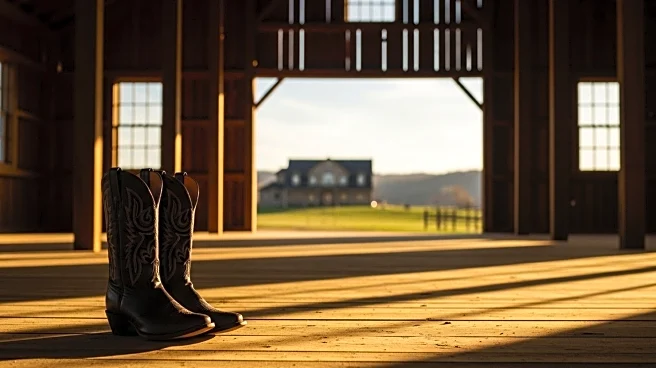What's Happening?
Several high-value ranch properties, owned by families for generations, are being listed for sale as heirs choose to cash out rather than maintain the legacy. Reynolds Ranch, a 7,600-acre property in California, is on the market for $30.7 million due to family disagreements over its future. This trend is echoed across other states, with properties like Antlers Ranch in Wyoming and Rocking Chair Ranch in Montana also being sold for millions. The demand for these properties remains strong, driven by buyers seeking expansive land and privacy, influenced by cultural phenomena like the 'Yellowstone' effect. Brokers report that many families are selling because the next generation lacks interest in ranching or cannot agree on the property's future.
Why It's Important?
The sale of these legacy ranches highlights a significant shift in generational wealth transfer and property ownership. As heirs opt to sell, it reflects broader economic and cultural changes, including the decline of traditional ranching and the rise of new wealth from tech and finance sectors. This trend impacts local economies and the real estate market, as these properties often attract wealthy buyers from urban areas seeking lifestyle changes. The sales also underscore the challenges of maintaining capital-intensive assets like ranches, which require substantial financial resources and commitment from family members.
What's Next?
The market for luxury ranches is expected to continue evolving, with more properties likely to be listed as families reassess their financial priorities and lifestyle choices. Real estate brokers anticipate ongoing interest from affluent buyers, particularly those influenced by media portrayals of ranch life. The generational transfer of wealth will play a crucial role in shaping future transactions, as families decide whether to retain or sell their properties. Additionally, the impact on local communities and ecosystems will be closely monitored as new owners take over these expansive lands.
Beyond the Headlines
The sale of these ranches raises questions about the preservation of cultural heritage and the environmental impact of changing land ownership. As historic properties are sold, there is a risk of losing traditional ranching practices and local biodiversity. The influx of new owners may bring different land use priorities, potentially affecting conservation efforts and community dynamics. This shift also reflects broader societal changes, as rural lifestyles are increasingly commodified and marketed to urban buyers seeking escape and exclusivity.









